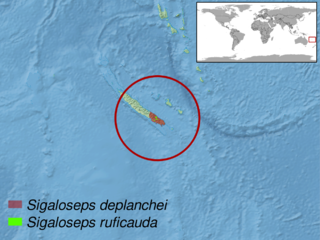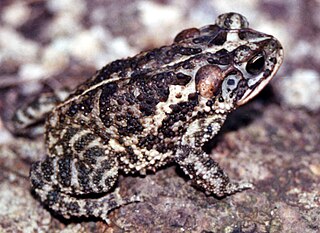
Skinks are lizards belonging to the family Scincidae, a family in the infraorder Scincomorpha. With more than 1,500 described species across 100 different taxonomic genera, the family Scincidae is one of the most diverse families of lizards. Skinks are characterized by their smaller legs in comparison to typical lizards and are found in different habitats except arctic and subarctic regions.

Sigaloseps is a genus of skinks which inhabit the moist, closed forest of southern New Caledonia.

Incilius coccifer is a species of toad in the family Bufonidae. It is found in southern Mexico and southeastward in the Central America through Guatemala, El Salvador, Honduras, and Nicaragua to northwestern Costa Rica. Several species that were formerly included in this species have been named as distinct species: Incilius porteri, Incilius ibarrai, Incilius pisinnus, and Incilius signifer. Its natural habitats are lowland dry and moist forests, and it occurs also in disturbed areas such as pastures, roadside ditches, gardens, and vacant lots in urban areas. It is an abundant and widespread species that is not facing significant threats.

Incilius is a genus of toads in the true toad family, Bufonidae. They are sometimes known as the Central American toads or Middle American toads and are found in southern USA, Mexico, Central America, and northern Pacific South America. They are an ecologically and biogeographically diverse group of toads, including micro-endemic species such as Incilius spiculatus that are restricted to undisturbed cloud forests, and widespread lowland species such as Incilius valliceps that predominantly occur in disturbed habitats.

Tenuipalpus is genus of mites in the family Tenuipalpidae, containing the following species:

Plocaederus is a genus of Long-Horned Beetles in the beetle family Cerambycidae. This genus has a single species, Plocaederus bellator. It is known from the South American countries Brazil, Ecuador, Guyana, French Guiana, Paraguay, and Suriname.

Psammogobius is a genus of fish in the family Gobiidae found in the Atlantic, Indian and Pacific Ocean.
Hamaederus pisinnus is a species in the longhorn beetle family Cerambycidae. It is found in Argentina and Paraguay.

Anthony Hume Whitaker was a New Zealand herpetologist, contributing a 50-year career of fieldwork, pioneering research and species discoveries. His is still the largest collection of reptile and amphibian specimens donated to Museum of New Zealand Te Papa Tongarewa.

Enoclerus is a genus of checkered beetles in the subfamily Clerinae.

Psammogobius pisinnus, the sandslope goby, is a species of goby in the family Gobiidae from Australia and New Guinea.

Eugongylinae is a subfamily of skinks within the family Scincidae. The genera in this subfamily were previously found to belong the Eugongylus group in the large subfamily Lygosominae.
Sigaloseps balios is a species of skink found in New Caledonia.
Sigaloseps conditus is a species of skink that are found in New Caledonia.

Sigaloseps deplanchei, Deplanche's shiny skink, is a species of lizard in the family Scincidae. The species is endemic to New Caledonia.
Sigaloseps ferrugicauda is a species of skink found in New Caledonia.

Sigaloseps ruficauda is a species of skink found in New Caledonia.

Geogarypus is a genus of pseudoscorpions in the Geogarypidae family. It was described in 1930 by American arachnologist Joseph Conrad Chamberlin. The genus has a cosmopolitan distribution.

Hamaederus is a genus in the longhorn beetle family Cerambycidae. There are about 16 described species in Hamaederus, found in Mexico, Central America, and South America. Most of these species were formerly members of the genus Plocaederus.














